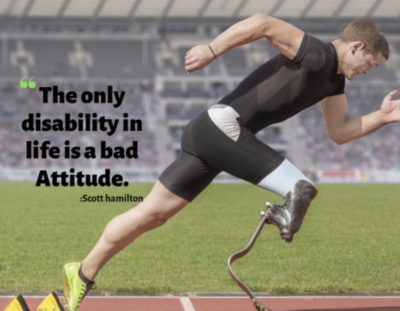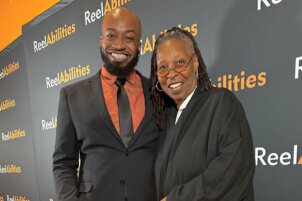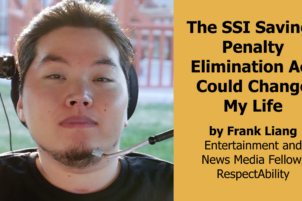On social media or TV, you probably have seen stories of a disabled person being celebrated at their High School prom, or being named an honorary member of their Football team. While these stories may seem harmless on the surface, these stories fall under the trope of “inspiration porn.”
What Is Inspiration Porn?
Inspiration Porn is used to describe the objectification of disabled people with the intention of making people without disabilities feel good. The term was made popular by Stella Young, a disabled comedian and activist, in her TED talk titled “I’m Not Your Inspiration, Thank You Very Much.” Young explained that society has been sold the lie that having a disability is a bad thing, so simply living with a disability makes someone exceptional. The media tends to glorify disabled people for existing and praise non-disabled people for helping disabled people. These superficial narratives have detrimental effects on the representation and perception of disabled people in society.
Explaining the Objectification and Why The Word “Porn”
The word “porn” might seem like an odd word choice to those who are new to the concept, but Young explained “I use the term porn deliberately, because they [media images] objectify one group of people for the benefit of another group of people. So in this case, we’re objectifying disabled people for the benefit of nondisabled people.” When the media reduces disabled individuals to objects of inspiration, based solely on their disability, it is dehumanizing to disabled people and contributes to harmful stereotypes and attitudes.
Examples of Inspiration Porn
Praising a disabled person for “overcoming” their disability: These examples not only rely on the notion that disability is negative and something to be solved, but they also undermine the accomplishments of disabled people by framing them in a condescending way. Historically, an example of this would be Helen Keller. Keller, who became deaf and blind after an illness as a child, was an example of inspiration porn before the term even existed. She was someone who achieved great things and helped the disabled community immensely. However, many people couldn’t see past her disability and praised her for essentially “overcoming” the challenges in her way due to her disability. In society today, some examples of news story headlines might look like this: “Deaf Teen Achieves Academic Excellence and Inspires Others” or “Young Woman with Cerebral Palsy Proves Doctors Wrong, Graduates College.” In both of these examples, the achievements of both people are being celebrated as a result of defeating the odds of their disability which is unfair. Disabled individuals should never feel like they have to “overcome” their disability, which is a part of their identity.
Uplifting stories about disabled people completing everyday tasks: Living with a disability and completing everyday tasks is not inspirational, it’s normal. The reason some may find a disabled person going to the grocery store or running errands inspiring is because society’s ableism has set the bar so low for people with disabilities. If you’re ever conflicted on if you should be feeling inspired by a disabled person doing something, think to yourself, “would this be inspiring if a non-disabled person was doing the same thing?”
Melissa, co-writer on this blog, has experienced this personally and shared her thoughts: “It is unfortunate that inspiration porn is still so prevalent in our society. When I go out in society and do normal everyday things like shop, I have been told by strangers that “I’m doing a great job” or “good for you” for just leaving my home. Disabled people shouldn’t have to be prepared to be approached by someone unknown in public who more or less congratulates them for just living their life. We aren’t automatically inspirational just because we have a disability.”
Photos/memes of disabled people with uplifting messages about hard work, gratitude, or a positive mental attitude: Images like these are created to inspire or motivate non-disabled people. Using disabled people to convey this messaging is, once again, objectifying disabled people. Additionally, these images overlook the systemic barriers and challenges that disabled individuals face, minimizing their experiences to a one-dimensional, feel-good story. As Young said in regards to these images, “no amount of smiling at a flight of stairs has ever made it turn into a ramp.”

Praising non-disabled people for including a person with a disability: The earlier example about a disabled person being celebrated at the Prom falls under this category. The issue here does not lie in the inclusion of a disabled person, but the coverage and reporting on it. If the non-disabled student really wanted to go to prom with the other student who just happened to be disabled, why did they need to publicize it and why did the media need to cover it? Disabled people shouldn’t be asked out for likes, or simply to make someone non-disabled feel good about themselves.
How To Do Better
There are two sides to approach this from in order to move beyond superficially “inspirational” stories about disabled people. At the heart of both sides is an attitude shift where disabilities are part of the human experience, not something extraordinary.
As a reporter:
- Always include thoughts from actual disabled people in disability based media stories. A majority of stories about disabled people are told by non-disabled people, leaving out the disabled person’s perspective. Whenever possible, let disabled people share their own stories.
- Broaden the coverage of stories covering disability, and include disabled people in stories that aren’t about disability.
- Never share or post photos or videos of disabled individuals without their informed consent on how it is being used.
- Don’t talk about a disabled person “overcoming” their challenges. Instead, fully explain what has caused these challenges, what they mean for others in the disability community, and what changes could be made to help address these struggles.
- Be aware of your language. Don’t speak about disability in a negative light or refer to disabled adults in a child-like manner.
As a consumer:
- Be an ally. Speak up and challenge harmful stereotypes when you come across them. Take the time to listen to the perspectives of disabled people without inserting your opinions or viewpoints.
- Share media and content that represents disabled individuals in a diverse, authentic, and inclusive way.
- Support organizations that amplify disabled voices from varying perspectives.
- Follow and support disabled content creators on social media platforms.
Melissa Tessaro co-wrote this piece.







